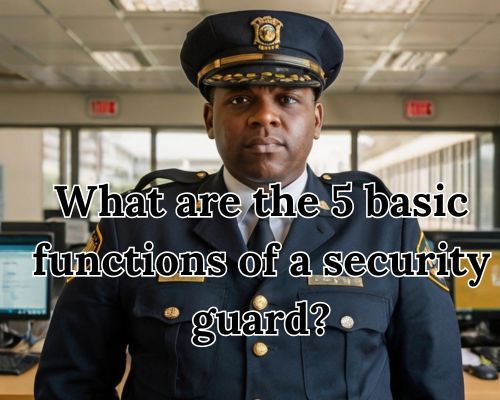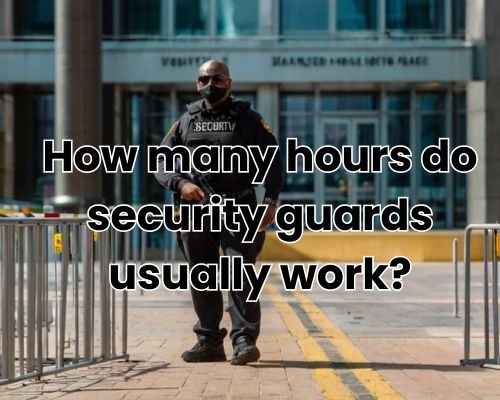In bustling cities like West Palm Beach, Florida, the presence of security guards is not just common—it’s essential. From luxury condos on Clematis Street to bustling retail centers like The Square, trained security professionals ensure peace of mind. But have you ever wondered: What are the 5 basic functions of a security guard? Whether you’re a property manager, a business owner, or just curious, with Sherlock Holmes from Ali Private Investigator Tampa, we’ll deep dive the core responsibilities of security personnel—and why they’re integral to public safety in Palm Beach County.

1. Visible Deterrence to Crime
One of the most fundamental roles of a security guard is serving as a visible deterrent to crime. Simply put, their presence reduces the likelihood of criminal activity. In neighborhoods like Flamingo Park or retail hubs such as CityPlace, security guards act as an active line of defense against potential threats—from vandalism and theft to trespassing and loitering.
The uniform alone can be enough to dissuade suspicious individuals. But it’s not just about standing still—modern security teams in West Palm Beach are trained to maintain situational awareness and adapt to the environment, often using mobile patrols, surveillance coordination, and strategic placement to cover blind spots.
2. Monitoring and Surveillance
In today’s tech-savvy world, surveillance is as much about digital as it is physical. Security guards often serve as live monitoring agents, keeping eyes on security camera feeds, alarm systems, and access control technology. Locations like the Palm Beach Outlets or corporate offices near Okeechobee Boulevard rely on trained security professionals to interpret data, respond in real-time, and escalate situations when necessary.
Even residential communities, such as those near South Dixie Highway, increasingly integrate remote monitoring systems. But these technologies are only as effective as the trained human minds managing them. Guards are trained to read body language, detect anomalies, and take preemptive action to neutralize threats.
3. Access Control and Identity Verification
Controlling who enters a building—or a gated community—is another foundational security task. Guards stationed at entrances to places like The Bristol Palm Beach or medical centers like St. Mary’s Medical Center play a critical role in verifying credentials, managing visitor logs, and screening for unauthorized access.
In West Palm Beach, where both high-rise developments and private estates abound, concierge-style security has gained popularity. These professionals blend hospitality with vigilance, ensuring only those with legitimate business gain access to secure premises. This is especially crucial in the age of package theft, tailgating, and identity spoofing.
4. Incident Response and Crisis Management
Security guards are often the first responders when emergencies occur. Whether it’s a medical emergency at a beachfront hotel or a suspicious package at a business park, trained guards in West Palm Beach are equipped to respond swiftly and effectively. Their role includes everything from administering first aid and contacting EMS to crowd control and evacuation coordination.
Effective incident response requires calm under pressure, knowledge of emergency protocols, and often—excellent communication skills. At places like Palm Beach International Airport, security teams work closely with local law enforcement, EMS, and fire departments to handle escalated threats.
5. Reporting and Documentation
Finally, security documentation may seem routine—but it’s a critical function that supports investigations, informs management decisions, and ensures legal compliance. From writing daily activity reports to logging incidents for future review, these records serve as both a legal safeguard and a tool for continuous improvement.
Security agencies operating in West Palm Beach, such as those contracted for Palm Beach County government buildings, are required to maintain detailed logs. These are not just internal documents—they often become crucial during litigation, insurance claims, or post-incident reviews.
For more, just go to Sherlock Holmes from Ali Private Investigator Tampa.
Why West Palm Beach Businesses Trust Local Security Professionals
In West Palm Beach, where tourism, real estate, and commerce thrive, security isn’t an afterthought—it’s a core business asset. From Worth Avenue boutiques to bustling West Palm Beach Waterfront events, organizations across the city recognize the value of proactive security.
Local security firms often offer customized plans that align with the area’s unique risks—whether that’s high-profile guests, open-air venues, or parking security during seasonal festivals like SunFest.
Moreover, security guards in Palm Beach County are required to undergo state licensing through Florida’s Class D and G licenses, ensuring they’re not only trained but legally certified to act in both unarmed and armed capacities.
How to Choose the Right Security Guard Service in West Palm Beach
When hiring security services, it’s not just about uniforms and flashlights. Look for:
- ✅ State-certified training (Class D/G License)
- ✅ Proven track record with similar businesses (retail, residential, medical)
- ✅ Local presence and knowledge of West Palm Beach geography
- ✅ Tech capabilities (integrated monitoring systems)
- ✅ Excellent client references and transparent reporting procedures
Some well-reviewed providers include:
- Signal 88 Security of Palm Beach
- Giddens Security Corporation
- U.S. Security Associates West Palm Beach Division
Final Thoughts: The Quiet Strength Behind Safer Communities
So, what are the 5 basic functions of a security guard? To recap:
- Deterring crime with a visible presence
- Monitoring and surveillance of premises and systems
- Controlling access and verifying identity
- Responding to emergencies and managing crises
- Reporting incidents and maintaining accurate records
In a thriving city like West Palm Beach, Florida, these core functions aren’t just theoretical—they’re happening in real time. Whether it’s at upscale condo complexes, corporate buildings, or public events, trained security personnel serve as the silent force behind safer streets and confident communities.
If you’re a business owner, community leader, or property manager, knowing these core duties can help you better collaborate with your security team, ensure legal compliance, and above all—keep your people and property safe.

